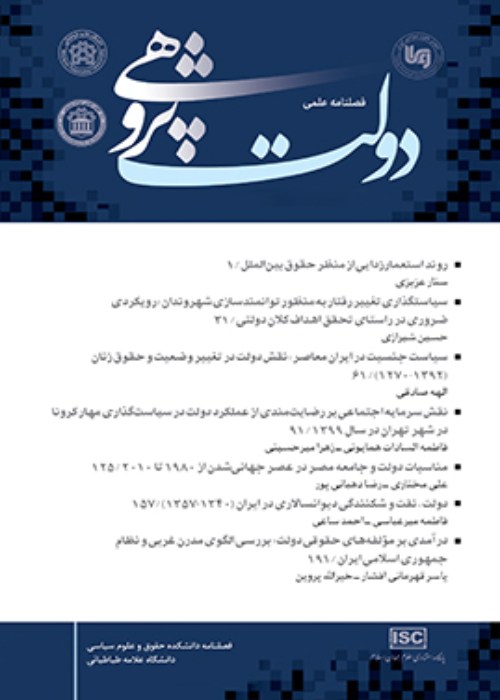The Crisis of the Capitalist Welfare State: An Analysis of the Views of Claus Offe
Author(s):
Abstract:
The main question of this paper is that why capitalist welfare state faces crisis. This question will be discussed from Claus Offe’s point of view. The method of this research is documentary research. Therefore Claus Offe and other main theorists’ books and articles, like Martin Carnoy, John Keane, Clyde Barrow and Leon Lindberg are used for explaining Claus Offe’s opinions. For Offe, in capitalist societies the state develops in response to periodic crises arising from the basic contradiction in capitalist production: the increasing socialization of production and continuing private appropriation. These crises give rise to development of adaptive mechanisms both internal to the market (oligopolization and monopolization) and through expanded state functions. Offe sees the state as a mediator of capitalist crises or as a crisis manager. In this context, he addresses two fundamental issues: First, what is the relationship of the state to dominant capitalist class, that how it is guaranteed that the state will represent the social interest of capital, while at the same time appearing to be a neutral arbitrator of competition among capitals and between capital and labor. Second, what are the limits imposed on the state's crisis-management functions by inherent necessity to reproduce capitalist relations of production. Findings of this article are that: Claus Offe rejects two principal theories of the class nature of the state: instrumentalism and structuralism. Offe believes that any particular state policy, serves a particular interest of the state, rather than the class interest as a whole. The capitalist state must and will fulfill four functions to reproduce itself. This is what guarantees its class-specific selectiveness. These four functions are: First, the state cannot order production or control it. State cannot initiate noncumulative production in private enterprises. Second, the actors of the state apparatus depend for their survival upon resources derived from the private accumulation process. Third, the state therefore not only has the authority but the mandate to sustain and create conditions of accumulation. Finally, the state has to conceal and deny the three above functions. These contradictory functions will lead to crisis of the state. Offe's capitalist state cannot resolve economic crises in a permanent way. Although called upon to intervene in the capital accumulation process in a way that will preserve capitalist relations of production and willing – through its own institutional interest - but to do so, it is beset by the interests of individual capitalist obstructing this intervention, and by the demands of the working class and other labor constituencies on whom it relies for its source of power. The state is constantly trying to fulfill its capital accumulation function while maintaining its legitimacy. The contradiction – the functional need to pursue systematic needs of an economic and power structure which successfully resists the fulfillment of those needs - explains why reformist policies of the capitalist state seem to display the cyclical pattern of motion in which no point of balance, compromise or equilibrium is arrived at.
Keywords:
Language:
Persian
Published:
Studies the State, Volume:1 Issue: 1, 2015
Page:
133
magiran.com/p1482312
دانلود و مطالعه متن این مقاله با یکی از روشهای زیر امکان پذیر است:
اشتراک شخصی
با عضویت و پرداخت آنلاین حق اشتراک یکساله به مبلغ 1,390,000ريال میتوانید 70 عنوان مطلب دانلود کنید!
اشتراک سازمانی
به کتابخانه دانشگاه یا محل کار خود پیشنهاد کنید تا اشتراک سازمانی این پایگاه را برای دسترسی نامحدود همه کاربران به متن مطالب تهیه نمایند!
توجه!
- حق عضویت دریافتی صرف حمایت از نشریات عضو و نگهداری، تکمیل و توسعه مگیران میشود.
- پرداخت حق اشتراک و دانلود مقالات اجازه بازنشر آن در سایر رسانههای چاپی و دیجیتال را به کاربر نمیدهد.
In order to view content subscription is required
Personal subscription
Subscribe magiran.com for 70 € euros via PayPal and download 70 articles during a year.
Organization subscription
Please contact us to subscribe your university or library for unlimited access!



